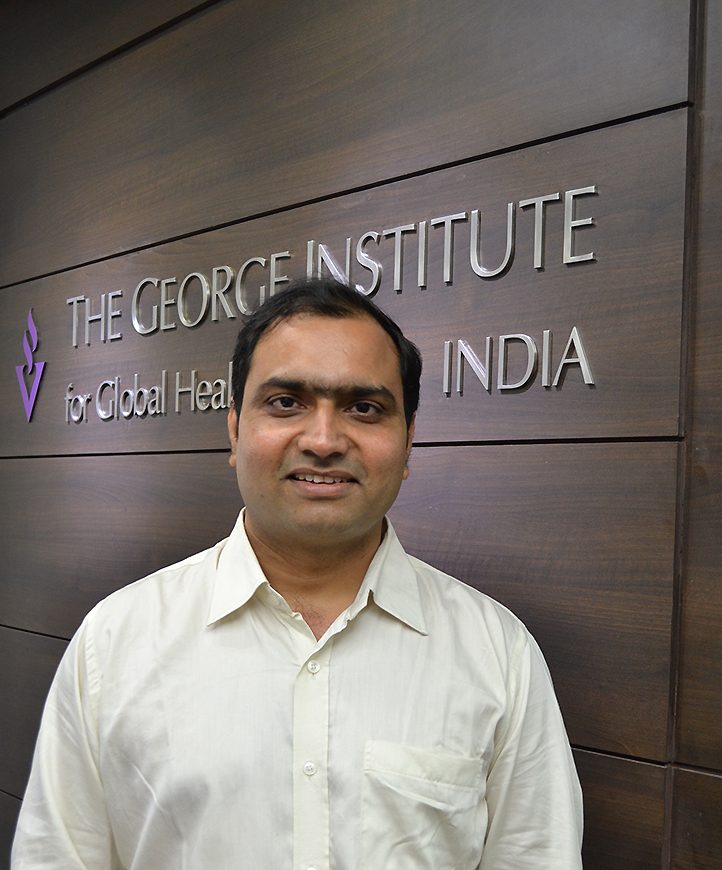
Dr Lalit Yadav: Health systems research in trauma and injury
Lalit Yadav is a Research Fellow at the George Institute for Global Health. His current research interest has been in the area of injury and trauma. He is part of the international orthopaedic multicentre cohort study in fracture care (INORMUS) funded through NHMRC, leading the sites in India and also Project Manager for intervention-4 of the Australia India Trauma Systems Collaboration (AITSC) programme.
Lalit has worked with various organizations in public health in both India and UK. Previous experience with Public Health Foundation of India (PHFI), he led the monitoring and evaluation of a complex intervention tobacco control and health promotion programme, involving several community-based organisations and health system across two states in India, funded through the Bill and Melinda Gates Foundation. He was also part of the research team, which has produced the first joint report on plain packaging of tobacco products in India, funded through Australia-India Institute at the University of Melbourne. While in the UK, Lalit worked on health improvement initiatives with the National Health Service (NHS), voluntary sector organisations, and patient and public involvement commission in West Midlands and Merseyside regions funded through the Department of Health. The initiatives were in the area of enduring mental health conditions (personalisation) through integrated health and social care; health promotion; and HIV and sexual health.
How long have you been working at The George Institute?
I have been working with the George Institute for nearly about three years.
What inspires you in the work you do and why?
I sincerely wish to contribute in improving health of the public and reduce inequalities in health through evidence-based and impactful research. Injury and trauma are among the leading causes for death and disability among adults, particularly in developing world. Insights from the studies I am involved in will drive the development and execution of clinical trials targeting improvement in outcomes for adults who sustain injury in a low and middle income country setting like India.
What is your current research focus?
My current research focus is health systems research in the area of trauma and injury.
What are the examples of other work/projects you been involved with at The George Institute?
I am involved in a prospective cohort study, INORMUS (International Orthopaedic Multicenter Study in Fracture care) and also the rehabilitation prescription component of the Australia-India Trauma Systems collaboration programme. I recently completed a study on care seeking behaviour and management of hip fractures in India, funded through University of Oxford.
What is your professional background?
I did bachelors in Dental Surgery (BDS) from India; Master’s in Public Health (MPH) and certificate in advanced quantitative research methods (Epidemiology) from the United Kingdom. In addition, I am certified in PRINCE2 (project management) technique.
What value/s of The George Institute do you appreciate the most and why?
Pursuit of excellence and transparency at work are the values which I appreciate most as these would facilitate innovative ways to solutions.
Why do you enjoy working at The George Institute?
The George Institute has an excellent support of team members. The working environment allows flexibility and an individual can work independently with adequate mentoring available whenever needed.
My first job was...
In the role of a project coordinator in Birmingham, UK. The project involved training community members to support patients with medically unexplained symptoms, mainly anxiety and depression at the General Medical Practices through interventions that addressed the wider determinants of health
My biggest achievement so far…..
I consider by having worked with statutory, voluntary and research organizations, I am able to think pragmatically in a given scenario and contributed to the sustainable efforts. I wish to capitalize my experience and learning potential to develop better understanding of evidence-base around integrated health systems and community empowerment for efficient delivery of health care with supporting policy structure.


